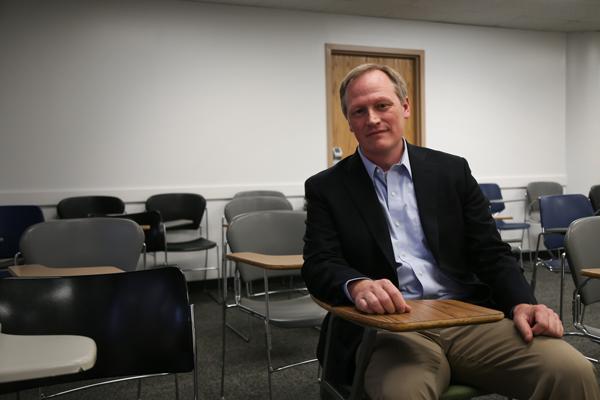History professors received critical phone calls and emails over winter break after the department unexpectedly made news for removing its U.S. history requirement.
Two months after the history department announced requirement changes, conservative media agencies criticized the fact that history majors would no longer be required to take U.S. history courses. Faculty said the media coverage following the announcement was unexpected because other universities have made similar changes without backlash.
The history department made the changes to add flexibility to the curriculum, which faculty members said they hope will attract more majors to the shrinking department.
Conservative sites like The College Fix, The Blaze, Breitbart and the National Review picked up the story. Kellyanne Conway, a GW Law School alumna, Trump campaign manager and soon-to-be White House counselor, criticized the change in a tweet late last month, linking to a Fox News article.
Multiple outlets, including Fox News and the National Review, claimed that the modified requirements are contrary to George Washington’s intentions for the University.
“He wanted the American university to be an American university,” Ian Tuttle wrote for the National Review. “The American university should cultivate leaders with a devotion to their nation, not an intellectual loyalty to an abstract notion,” Tuttle wrote.
Katrin Schultheiss, the chair of the history department, said she was taken aback by the public reactions to changes in degree requirements. Schultheiss said she received responses ranging from extreme anger to genuine curiosity, with some individuals mistakenly believing that the department had removed U.S. history courses altogether.
“I got some emails where some people were like, ‘We understand that the GW history department is eliminating American history.’ I got several responses like that and I, of course, had to write them right back to clarify,” Schultheiss said. “It’s also astounding to me that almost none of the complainants bothered to go on the website and see what courses are offered.”
Other universities, including Ivy League institutions like Yale University, have also eliminated U.S. history requirements for history majors, Schultheiss added.
Schultheiss said the department considered what other universities were doing to attract history majors after a drop in enrollment. By eliminating unnecessary obstacles like a foreign language or regional history requirement, professors hoped to sway on-the-fence students interested in the major, she said in November.
Schultheiss said the controversy was unexpected but attributed the heightened attention to the recent U.S. presidential election.
“That’s why it got this kind of attention where other programs did not get this kind of attention in previous years,” she said.
The department will stand by the changes and will encourage students to seek a broad education in history, Schultheiss added.
Eric Arnesen, a professor of history and the executive associate dean for faculty affairs who studies American labor history, said after media coverage, faculty in the department received critical emails and voicemails from parents, alumni and strangers.
“As a result of the coverage, members of the department have received hostile, and even abusive, emails and voicemail messages,” Arnesen said in an email. “Those emails and messages, at least the ones that I have received, are based on fundamental misunderstandings of how the department operates and what its requirements are.”
Arnesen said he was not personally contacted by media outlets, but that some of his colleagues were. Neither faculty members nor department administrators commented to media outlets, allowing the University to respond instead.
Denver Brunsman, a professor of history and the director of undergraduate services for the department who studies early U.S. history, said news coverage of the department’s changes came as a surprise because the department has always had a strong focus on U.S. history.
“I think that the controversy all took us by surprise because the last thing in the world that we would ever imagine ourselves to be would be anti-American or against American history,” he said.
Brunsman said that even without the requirement, he believes history majors will elect to take courses on U.S. history. It’s unlikely that a student to go through the program without taking at least one class on the topic because so many of the upper level courses offered by the University are at least partially influenced by U.S. history, he said.
“I think that this was the spirit in which we made our changes, that American history is so dominant at GW that it’s almost unnecessary to tell students that they have to take it. It’s what our students overwhelmingly do,” Brunsman said.
A Fox News article cited a report from the American Council of Trustees and Alumni, a nonprofit which seeks to empower trustees and alumni by producing reports on history curricula at U.S. universities. The report, released last July, stated that one-third of America’s top colleges do not require history majors to take a course in U.S. history.
Michael B. Poliakoff, the president of the ACTA, said that in light of the controversy, GW should incorporate U.S. history into general education requirements.
“After all, George Washington University is so opportunely situated in the nation’s capital. It’s so engaged in issues of civic life that it is really sad and a bad reflection on the school not to make an American history course part of the education of all students,” Poliakoff said. “I’ll use a stronger term: For a student to leave college without such a background is really running the danger of civic disempowerment.”
David Bruce Smith, an alumnus, parent and former member of the Board of Trustees, said dropping the mandatory U.S. history course for majors is a disservice to students and that a global historical focus should begin with the U.S.
“I’m told the historical focus, in the department, is now to go global. Fine, but first-things-first: We need to know where we came from and how we got here. We only discover that by delving into American history,” Smith said.





